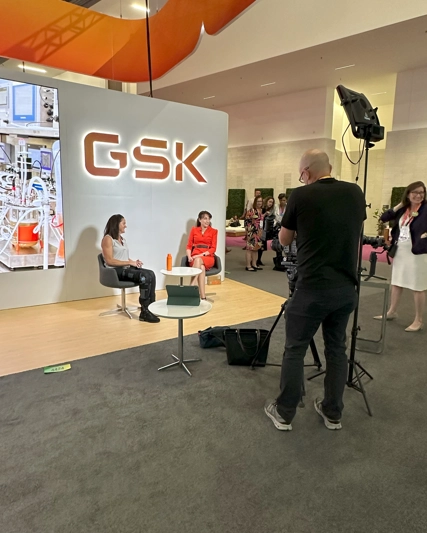Issued: Philadelphia, PA
For media and investors only
New data for AREXVY, GSK’s RSV vaccine, show potential to help protect adults aged 50 to 59 at increased risk for RSV disease
- Preliminary results from phase III trial show primary endpoints met, with non-inferior immune responses observed in adults aged 50-59 compared to adults aged 60 and older
- Adults aged 50 and above with certain underlying medical conditions are at increased risk for RSV disease1
- GSK is on track to be the first company to submit data in this population to regulators, with decisions on potential label expansion expected in 2024
GSK plc (LSE/NYSE: GSK) today announced positive preliminary results from its phase III trial [NCT05590403] evaluating the immune response and safety of AREXVY (Respiratory Syncytial Virus Vaccine, Adjuvanted) in adults aged 50 to 59, including those at increased risk of respiratory syncytial virus (RSV) lower respiratory tract disease (LRTD) due to certain underlying medical conditions. These results will be presented at the US Centers for Disease Control and Prevention’s (CDC) Advisory Committee on Immunization Practices (ACIP) meeting on October 25, 2023. This vaccine is currently approved in the US for active immunization for the prevention of RSV-LRTD in adults 60 years of age and older. It is also approved in Europe, Japan, and several other countries.
The vaccine elicited an immune response in adults aged 50 to 59 at increased risk for RSV disease due to select underlying medical conditions that was non-inferior to that observed in adults aged 60 and above, meeting the trial’s primary co-endpoint. Vaccine efficacy has previously been demonstrated in adults aged 60 and above. The co-primary endpoint was also met for the broader group of adults aged 50 to 59 also enrolled in the trial. Safety and reactogenicity data were consistent with results from the initial phase III program. The most common local adverse event was pain, and most common systematic adverse events were fatigue and headache, most of which were transient and mild in intensity.
Tony Wood, Chief Scientific Officer, GSK, said: “This trial reinforces our confidence in our RSV vaccine’s ability to help protect adults aged 50 to 59 at increased risk for RSV-LRTD. We will submit these data for regulatory review as quickly as possible with the goal of offering adults in this age group the option of a vaccine for the first time.”
RSV is a common, contagious virus that can cause severe respiratory illness.2 Estimated rates of infection and hospitalization may be higher than reported in many high income countries, including the US.3 There is a substantial burden of RSV-associated illness for adults at increased risk for RSV disease due to advanced age, immunocompromised status, or underlying medical conditions, such as chronic obstructive pulmonary disease (COPD), asthma, and chronic heart failure. RSV can exacerbate these conditions and lead to pneumonia, hospitalization, or death.4
Final results from this trial will be presented at an upcoming medical conference and submitted for peer-reviewed publication. The data will also be submitted to the US Food and Drug Administration (FDA) and other regulators to support potential label expansions.
Trial Design
NCT05590403 is a phase III, placebo-controlled, observer-blind, randomized, multi-country immunogenicity trial to evaluate the non-inferiority of the immune response and evaluate safety in participants aged 50 to 59 at increased risk of RSV-LRTD compared to older adults aged 60 years and above after a single dose of GSK’s RSV vaccine. Immune response in participants aged 50 to 59 with pre-defined stable chronic diseases leading to an increased risk of RSV disease was assessed (n=570). These included participants with chronic pulmonary disease, chronic cardiovascular disease, diabetes, chronic kidney disease or chronic liver disease. Immune responses in a broader group of participants aged 50 to 59 without these pre-defined chronic diseases (n=570) was also evaluated compared to adults aged 60 and older. Approximately 1,520 participants were enrolled across eight countries.
The trial’s primary endpoints were RSV-A and RSV-B neutralization titers of both groups of 50 to 59 year olds at one month after the vaccine administration compared to adults aged 60 and older. There were also safety and immunogenicity secondary and tertiary endpoints. The trial is ongoing to collect further immune data at six months and 12 months after vaccine administration.
About AREXVY (Respiratory Syncytial Virus Vaccine, Adjuvanted)
AREXVY contains recombinant respiratory syncytial virus glycoprotein F stabilized in the prefusion conformation (RSVPreF3). This antigen is combined with GSK’s proprietary AS01E adjuvant.
The vaccine was approved by the US FDA on May 3, 2023, for the prevention of LRTD caused by RSV in individuals 60 years of age and older.
In June 2023, the European Commission authorized the vaccine for active immunization for the prevention of LRTD caused by RSV in adults aged 60 years and older.
In September 2023, Japan’s Ministry of Health, Labor and Welfare approved the vaccine for the prevention of RSV disease for adults aged 60 years and above.
The vaccine has also been approved in the UK and Canada. Regulatory reviews in other countries are ongoing. The proposed trade name remains subject to regulatory approval in other markets.
The GSK proprietary AS01 adjuvant system contains QS-21 STIMULON adjuvant licensed from Antigenics Inc., a wholly owned subsidiary of Agenus Inc.
Please see the full US Prescribing Information: https://gskpro.com/content/dam/global/hcpportal/en_US/Prescribing_Information/Arexvy/pdf/AREXVY.PDF
Indication for AREXVY
AREXVY is indicated for active immunization for the prevention of lower respiratory tract disease (LRTD) caused by respiratory syncytial virus in individuals 60 years of age and older.
Important Safety Information for AREXVY
- AREXVY is contraindicated in anyone with a history of a severe allergic reaction (eg, anaphylaxis) to any component of AREXVY
- Appropriate medical treatment and supervision must be available to manage possible anaphylactic reactions following administration of AREXVY
- Syncope (fainting) may occur in association with administration of injectable vaccines, including AREXVY. Procedures should be in place to avoid injury from fainting
- Immunocompromised persons, including those receiving immunosuppressive therapy, may have a diminished immune response to AREXVY
- The most commonly reported adverse reactions (≥10%) were injection site pain (60.9%), fatigue (33.6%), myalgia (28.9%), headache (27.2%), and arthralgia (18.1%)
- Vaccination with AREXVY may not result in protection of all vaccine recipients
Please see full Prescribing Information.
About RSV in Adults
RSV is a common contagious virus affecting the lungs and breathing passages.2 Adults can be at increased risk for RSV disease due to comorbidities, immune compromised status, or advanced age.4 RSV can exacerbate conditions, including COPD, asthma, and chronic heart failure and can lead to severe outcomes, such as pneumonia, hospitalization, and death.4 Each year, approximately 177,000 adults 65 years and older are hospitalized in the US due to RSV; an estimated 14,000 cases result in death.5 For adults 60 and older, data suggest an increased risk for severe RSV infection that can lead to hospitalization.6,7
About GSK
GSK is a global biopharma company with a purpose to unite science, technology, and talent to get ahead of disease together. Find out more at gsk.com.
Cautionary statement regarding forward-looking statements
GSK cautions investors that any forward-looking statements or projections made by GSK, including those made in this announcement, are subject to risks and uncertainties that may cause actual results to differ materially from those projected. Such factors include, but are not limited to, those described under Item 3.D 'Risk factors” in the company's Annual Report on Form 20-F for 2022, and Q2 Results for 2023 and any impacts of the COVID-19 pandemic.
References
- Branche et al. Incidence of Respiratory Syncytial Virus Infection Among Hospitalized Adults, 2017-2020. Clin Infect Dis 2022:74:1004–1011.
- National Foundation for Infectious Diseases. Respiratory Syncytial Virus. Accessed October 2023. Available at: www.nfid.org/infectious-disease/rsv/
- Savic M, Penders Y, Shi T, Branche A, Pirçon J-Y. Respiratory syncytial virus disease burden in adults aged 60 years and older in high-income countries: a systematic literature review and meta-analysis. Influenza Other Respir Viruses 2022 2023; 17:e13031.
- Centers for Disease Control and Prevention. RSV in Older Adults and Adults with Chronic Medical Conditions. Accessed October 2023. Available at: www.cdc.gov/rsv/high-risk/older-adults.html
- Falsey AR, et al. N Engl J Med 2005; 352:1749-1759 DOI: 10.1056/NEJMoa043951. Accessed October 2023.
- Tseng HF, Sy LS, Ackerson B, et al. Severe morbidity and short- and mid- to long-term mortality in older adults hospitalized with respiratory syncytial virus infection. J Infect Dis. 2020;222(8):1298-1310. doi:10.1093/infdis/jiaa361.
- Belongia EA, King JP, Kieke BA, et al. Clinical features, severity, and incidence of RSV illness during 12 consecutive seasons in a community cohort of adults ≥60 years old. Open Forum Infect Dis. 2018;5(12):ofy316. doi:10.1093/ofid/ofy316.


